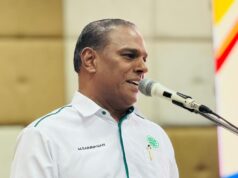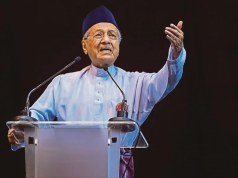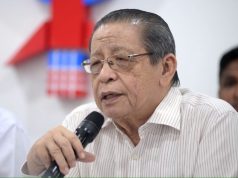KUALA LUMPUR, April 7 – Comparisons have been drawn between father and son ever since Datuk Seri Najib Tun Razak became prime minister, and Saturday night’s launch of the Barisan Nasional (BN) general election manifesto threw up remarkable similarities between the two in leading the nation.
More than four decades set apart the administrations of the two but the mindset and focus remain extraordinarily alike.
Tun Abdul Razak Hussein(pic), who was prime minister between 1970 and 1976, never used slogans like “People First” and “Performance Now” but those were precisely the basis of the strategies and actions he took.
As political scientist Dr Chandra Muzaffar pointed out, Tun Razak brought about transformation of the nation in several ways, at a time when Malaysia was striving to recover from its worst racial riots, following a weak performance by the ruling Alliance, BN’s predecessor, in the 1969 General Election.


Chandra told a TV forum immediately after the launch of the BN manifesto that trust was a vital ingredient for effective leadership, which Tun Razak nurtured – and subsequently enjoyed – among all communities. Is it a coincidence then that Najib has set trustworthiness as the key factor that the electorate needs to seriously consider when deciding on the next
government in the 13th General Election?
“Because his transformation process was based upon trust, we find that in all aspects of national life now, Tun Razak’s imprint is there. And Datuk Seri Najib is holding to this principle, too.
“Tun Razak’s transformation measure resulted in constructive changes that brought about stability to the country,” said Chandra. For instance, he introduced changes to the country’s Constitution that entrenched the rights of the Malays and the Bumiputeras.
He then transformed the national economic landscape by implementing the New Economic Policy that was designed to ensure that all communities have a fair share of an ever-growing economic pie. Chandra, who is also president of the International Movement for a Just World (Just), said Tun Razak also transformed the national education system, including the status of Bahasa Melayu, and introduced the Rukunegara, which documents the five principles of nationhood, that helped nurture racial harmony and arouse the spirit of nationalism.
In foreign policy, Tun Razak shifted Malaysia’s pro-western bias towards a policy of neutrality and friendship with all, which led China to establish ties with Malaysia and cut off all support for the communist terrorist menace that had been plaguing the country since the end of the Second World War.
China hugely appreciated the gesture and has always held Tun Razak in great esteem, now extending it to Najib and his family, too. So, although Najib used 21st century terms to make precise election pledges on Saturday night, senior citizens could readily recall how Tun Razak focused on bringing development to all parts of the country.
BERNAMA










